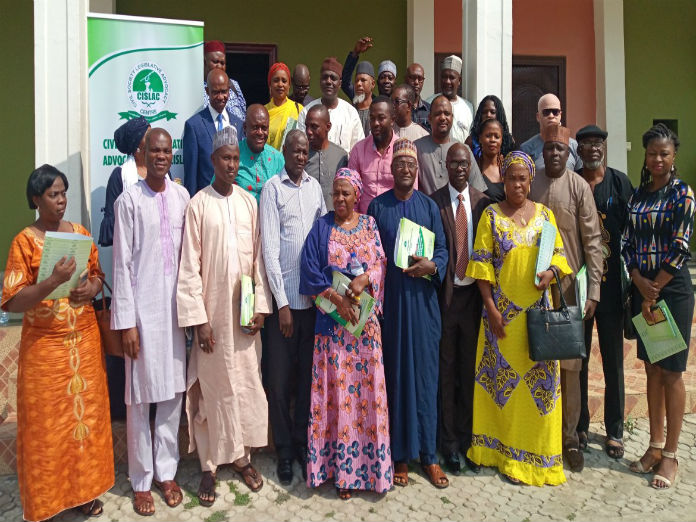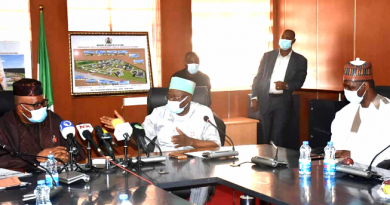CISLAC Trains Clerks of National Assembly Committees, CSOs
-The Sight News
A capacity building workshop organised by the Civil Society Legislative Advocacy Centre CISLAC), has started Tuesday for clerks of select National Assembly Committees and Civil Society Organisations on Anti-corruption in Keffi, Nasarawa state..
This is just as it noted with dismay, that the exercise of legislative functions has attracted a lot of discontent among Nigerians, who accuse the legislature of corruption and/or abetting corruption and mismanagement.
The Civil Society Legislative Advocacy Centre(CISLAC), has emphasized that the role of the legislature, as a law making and oversight body, remains critical to any successful anti-corruption campaign in Nigeria.
The Executive Director, CISLAC, Auwal Musa, who was represented by the Director Legal of CISLAC, Barrister Adesina Oke, noted that the workshop with the theme, “Constitutional Oversight, Powers of the National Assembly: The Role of Committees with Anti-Corruption Mandate”, aims to create a better understanding of the requirements of clerks/officers as they carry out oversight and how citizens are abreast of the work the committee is doing to enable it to build citizens’ confidence in the oversight role of the legislature.
He emphasized, that since the issue of corruption remains persistent in Nigeria, putting in place adequate and effective anti-corruption response mechanisms with a view towards tackling the menace remains important.
According to him, “Emphasis is placed on the public sector because it accounts for an estimated 70% of corruption cases in Nigeria, thus, enthroning integrity and minimising corruption in both the public and the private sector continues to remain a priority, featuring prominently in the form of programmes and policies of successive government administrations”.
The Executive Director, further pointed out that beyond lawmaking, the legislature serves various functions to improve efficiency, detect and prevent poor administration, waste, abuse, arbitrary and capricious behaviour, or illegal and unconstitutional conduct.
“The Nigerian parliament has a constitutional obligation to “expose corruption, inefficiency or waste in the execution or administration of laws within its legislative competence and in the disbursement or administration of funds appropriated by it”, under the 1999 Constitution as Amended”, Musa remarked. “The Constitution further empowers the National Assembly or State House of Assembly to direct or cause to be directed, an investigation into any matter in respect to which it has the power to make laws”.
Also, speaking on the Constitutional Imperatives for National Assembly Oversight Roles, a Consultant, Barr. Emmanuel Anyaegbunam, pointed out that the basic issue of oversight can come in form of control, investigation, annual or periodic reports or records, adding that every other general settings that enables the clerk to be the watch dog of the populace, keeps him or her within the boundary of oversight.
While noting that there is no constitutional democracy without oversight, he explained that the basic purposes of oversight are; To promote democracy and constitutionalism; Checks and balances; Ensure the Executive’s compliance with legislative intent; Check waste and mismanagement; Educate and inform the citizenry and protect their rights; Bring citizenry trainings and inform the citizens; Confirm nationwide visibility on Legislators and, Enthrone efficiency and due process.
He listed the challenges of oversight to include; Lack of professionalism; Poor funding; High turnover of legislatures; Politics interest; Poor civil society action and, Poor political, cultural and socialization process.
Speaking on the solution and way forward, he stressed that there is an urgent need for collaborative engagement of crucial departments as well as experts engagement; Dynamic research and continuous capacity building; Reorganization of the committees and; Creating institutional research outfits. He that there should be tenures so as to help them grow and do better on the job.
Earlier, the Programme Manager, Democratic Governance, CISLAC, Mr.Okeke Anya, while giving a brief overview of the project, noted that the focus of CISLAC is to look at how the legislature carries out its mandate of oversight of the various Ministries, Departments and Agencies of government.
While pointing out that there is need to carry out proper oversight functions in the areas of budget utilization as well as foreign loan, he urged the clerks to be interested in such issues and to use their powers, by asking pertinent questions.
The Civil Society Legislative Advocacy Centre (CISLAC), which is the National Contact of Transparency International in Nigeria, organized the capacity building workshop for relevant National Assembly Committees with anti-corruption mandates within the project titled Strengthening Legislative Accountability and Anti-Corruption Mechanisms (SLAAM) in Nigeria with support from MacArthur Foundation.




